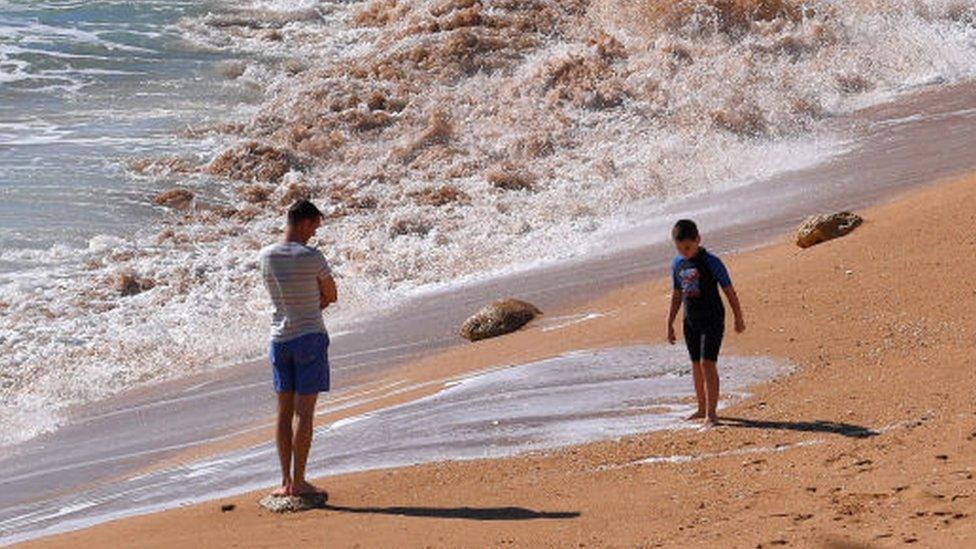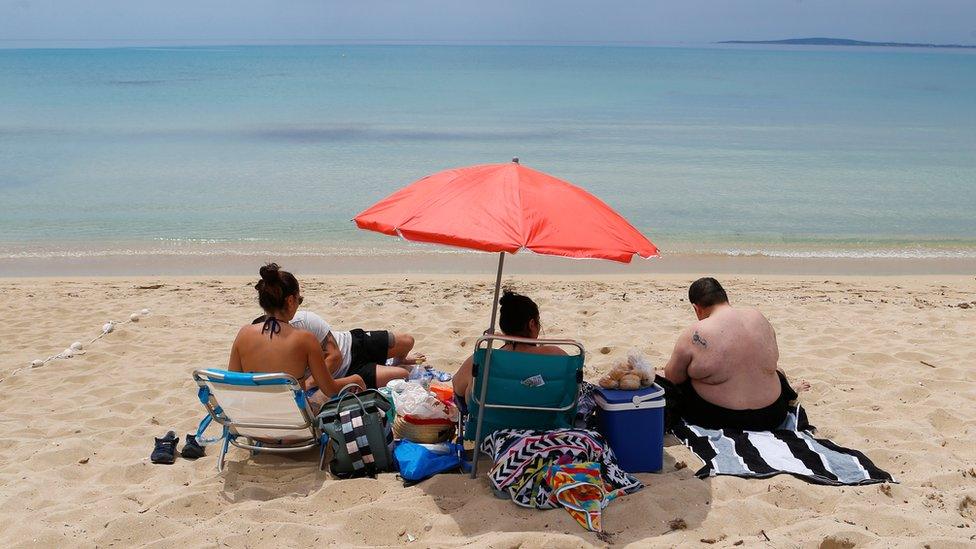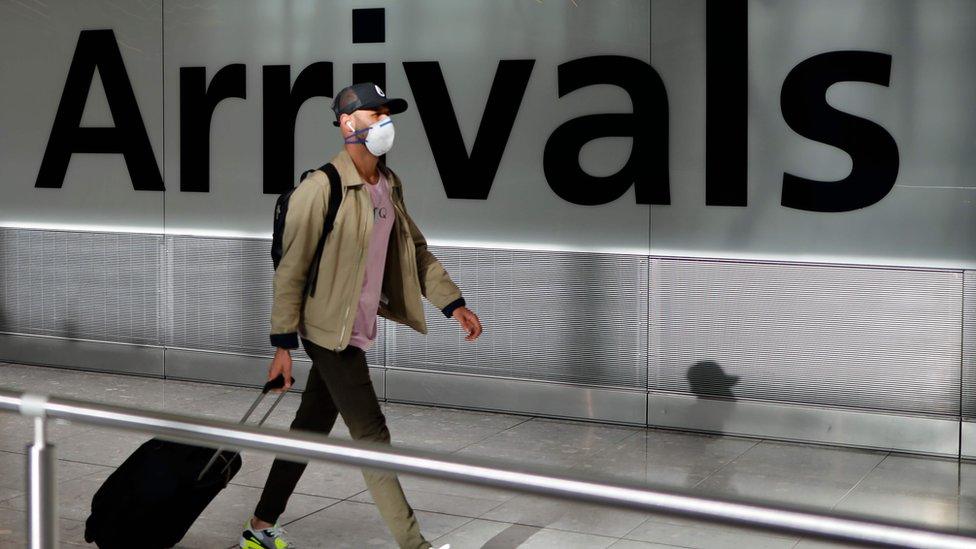Coronavirus: UK quarantine plans and £1,000 penalties confirmed
- Published
Home Secretary Priti Patel: 'We are now more vulnerable to infections being brought in from abroad'
Plans to force almost all arrivals to the UK to isolate for 14 days have been confirmed by the home secretary.
Priti Patel told the Commons that Border Force will check that travellers fill out a form with their contact details and location for isolation.
Leaving isolation prematurely in England could result in a fine of up to £1,000 or prosecution, she said.
"We will not allow a reckless minority to put our domestic recovery at risk," she said.
Ms Patel told MPs that scientific advisers had said quarantine would not have been effective earlier in the coronavirus pandemic when infection rates in the UK were higher.
But now, imported cases of the virus posed a more significant threat, she said, so it was now important to "protect our hard-won progress as we move in the right direction".
It comes as the latest Department of Health figures show another 359 people have died after contracting coronavirus, bringing the UK total to 39,728. An additional 1,871 people tested positive in the last 24-hour period.
Asked at the Downing Street briefing whether he would recommend people in the UK book foreign holidays, Prime Minister Boris Johnson urged the public to follow Foreign Office guidance against non-essential travel. "We've got to knock this virus on the head," he said.
And while he urged EU workers who had left the UK because their jobs had disappeared during lockdown to return, he ruled out any alternatives to quarantine for them, such as a medical certificate.
"Come back to London, or the UK - but you've got to quarantine. Everybody has been in lockdown for a long time, I know it's an imposition, but we really have got to beat this virus," he said.
Ms Patel said in the Commons that the "proportionate and time-limited measures" would come into force on Monday, with "limited exemptions" intended to ensure supplies of essential items such as food and protective equipment were not disrupted.
The regulations apply to England, and Ms Patel said devolved administrations would set out their own rules for enforcing the quarantine.
Ms Patel said the measures would be reviewed after three weeks and the government would aim to ensure greater freedom in the long term, including establishing "international travel corridors" with countries deemed to be safe.

MPs demand a more targeted approach

Many MPs - including Conservatives - were in the Commons raising concerns about the government's approach to quarantine.
Firstly, they argue this policy is being brought in too late. They believe it should have been introduced when the virus was spreading in Europe - and before it took hold here.
Many now have concerns the government is overreacting as it tries to prevent a second spike.
They told the home secretary they are worried a blanket quarantine will have a devastating impact on airlines, airports and the wider tourism industry. Very few MPs showed support for the government's approach.
They want the government to take a more targeted approach - finding ways of allowing travel from certain countries where transmission levels are lower.

Ryanair said the proposals were "utterly ineffective", with arrivals travelling from the airport before they isolate, potentially spreading infection, while the government would phone "less than 1%" of them to check they were complying.
"This 14-day UK quarantine is ineffective, completely useless, and will have no effect on British passengers who will largely ignore it," a spokeswoman said.
The Confederation of British Industry said it needed more detail on how the policy would be reviewed, who would be exempt and how the international travel corridors with key trading partners could be created.
"Businesses and government urgently need to draw up an internationally coordinated plan to get people safely moving across borders as soon as possible," said CBI president John Allen.

LOCKDOWN UPDATE: What's changing, where?
SCHOOLS: When will children be returning?
EXERCISE: What are the guidelines on getting out?
THE R NUMBER: What it means and why it matters
LOOK-UP TOOL: How many cases in your area?

Sources at the French and Italian foreign ministries told the BBC there had been no bilateral talks yet about lifting the quarantine plans and establishing travel corridors or "air bridges" with the UK.
"If the UK imposes a quarantine period, we will apply it too," a French official said.
The plan has sparked concern among several Tory MPs, with former cabinet minister Theresa Villiers calling for it to be suspended while travel corridors are set up, to "save jobs in aviation and let families go on their summer breaks in the sun".
Speaking at an earlier debate about the aviation industry, former prime minister Theresa May said quarantine would "close Britain off from the rest of the world".
Deportation 'a last resort'
Labour's shadow home secretary Nick Thomas-Symonds said people needed reassurance that this was not "a three-week fudge to try to spare the government embarrassment for failing to grip this issue at the right time".
He said only 273 people had been quarantined in the early stages of the pandemic as 18 million visitors arrived in the UK, with the government's own advisers saying many cases came not from China but from places in Europe.
Under the new rules, most arrivals to the UK will have to fill out a "contact locator form" with details of where they will isolate for two weeks and how they can be contacted.
Anyone failing to remain in isolation will face a £1,000 fixed penalty in England, with prosecution and an unlimited fine potentially to follow, the Home Office said.
Failure to fill in the form can also be punished with a £100 fine.
Border Force can refuse entry to non-residents who do not comply, and the Home Office also said that deportation would be considered "as a last resort" for foreign nationals who fail to isolate.

MISSING FOOTBALL? Watch The First Team
COVID-19 VACCINE: How long will it take to make?

- Published3 June 2020

- Published1 June 2020

- Published24 May 2020
